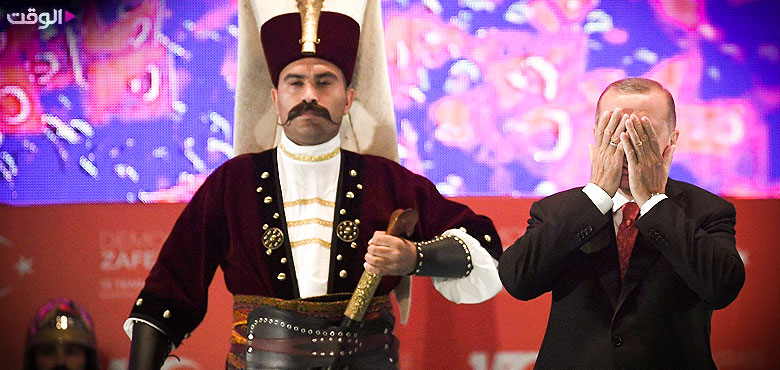Alwaght- Ankara and Tel Aviv have begun the rapprochement process with Azerbaijan President Ilham Aliyev’s mediation. This was the title of news first published by Israeli media and then confirmed by remarks of the Turkish President Recep Tayyip Erdogan. On December 25, Erdogan talked about Turkish willingness to de-escalate tensions with the Israeli regime.
The de-escalation comes as over the past years, especially over the past year, Israeli-Turkish relations have been chilly and rivalry between the two regional actors was quite noticeable at various levels, from the competition in Libya and Eastern Mediterranean to the Ankara opposition to the Arab-Israeli normalization project that was launched officially in August with the UAE peace deal with the Israeli regime.
The new approach by Ankara is coming as during the 45-day Karabakh war between Azerbaijan and Armenia that ended last month Turkey and the Israeli regime cooperated massively in their backing to the Azerbaijani push for capturing the disputed region.
But could the Karabakh war partnership provide an adequate justification for the two sides to ignore their past few years’ rifts? What other factors played a role in Erdogan’s about-face?
Along with answering these questions, in an overview of the Turkish foreign policy it can be said that the ruling Justice and Development Party (AKP) is separating ways from its stated ideals and goals, revealing the expansionist spirit in the Turkish foreign policy and betrayal of Turkey’s Islamic identity by Erdogan.
Erdogan in the transition from zero-conflict policy to maximum tensions
The foreign policy doctrine of the AKP since assuming power in the country in 2002 was introduced under neo-Ottomanism, post-Kemalism, peripheralism, and Anatolic Islamism. But without any doubt, the central point in the Turkish foreign policy was the “strategic depth” theory raised by Ahmet Davutoglu, the former prime minister, foreign minister, and member of the AKP. Essentially, Davoutoglu’s doctrine is based on a kind of return to a look to the East and Islamic identity of Turkey. In the eyes of Davutoglu, Turkey is a Middle Eastern, Balkan, Caucasian, Central Asian, Mediterranean, Persian Gulf, and Red Sea state that can employ its influence in these regions and play a global and strategic role.
One of the essential principles of Davutoglu’s doctrine is the zero-conflict strategy. In fact, in the AKP’s foreign policy doctrine, minimizing the tensions with the neighbors should be put on Ankara's agenda, and this path not only meant criticism of the past policies but also presented a formula to set up a positive and constructive framework of the future outlooks. However, over the past years and particularly since last year, Erdogan fully set aside this approach and took steps towards maximized disputes with the neighbors.
In the past year, Turkey embraced tensions with a majority of its neighbors and nearby countries. Countries like Bulgaria, Greece, Syria, Iraq, Armenia, Iran, Egypt, Saudi Arabia, and the UAE, and even international actors like the US, France, and Germany experienced frayed ties with Turkey. The zero-conflict strategy seems to have given place to maximum tensions with the world in Turkey’s policy.
Expansionist spirit in Erdogan’s neo-Ottomanism
The current AKP policy is not that of the past, as the radicals assume the power in the party. In the past, the party had a vast scope of friendship with the regional states but in the current conditions moderate figures like Ali Babacan, Abdullah Gul, and a prominent strategist like Davoutoglu are not present in its body to direct it to a logical strategy towards the neighboring countries.
The present decision-makers in the AKP are pushing the nation’s foreign policy towards expansionism, a policy implemented using Ankara-backed terrorist groups. These groups are also used in Libya and Karabakh conflicts, too. In other words, Erdogan by adopting an expansionist policy embarked on occupation and active interventionism in the regional crises.
Erdogan’s betrayal of Turkish Islamic identity
Turkey’s shift towards a rapprochement with the Israeli regime should be read as Erdogan’s betrayal of the Islamic identity of Turkey. According to a poll conducted by an Israeli institute, among 12 Muslim countries, the people of Turkey are the top opponents of normalization with Tel Aviv. According to the institute, which is affiliated with the Israeli ministry of national infrastructures, 99 percent of the Turks deem a “treason” accepting a normal life with the Israeli regime. Furthermore, pieces of evidence show that the Turkish citizens have the largest support to Lebanese Hezbollah and Palestine’s Hamas as archenemies of Tel Aviv.
With these data emanating out of Turkey, it can be said that re-establishing the diplomatic ties with the Israeli regime marks a brazen sign of Erdogan’s antipathy to the original identity of the Turkish society. In fact, Erdogan’s policies have emptied out Islamic essence from the country’s foreign policy. Instead, he leans to expansionism and a radical nationalist spirit. Taking the role of the Ottoman sultans, Erdogan aspires to establish a history of glory and development for turkey based on the National Covenant Bill, an expansionist law that was passed by the Ottoman parliament in 1920 and mentioned regions out of the Turkish borders as Turkey’s.



























